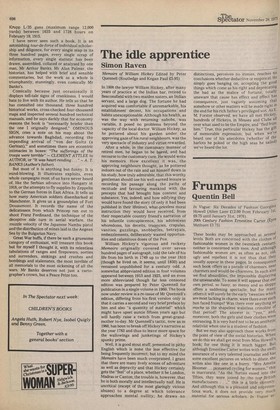The idle apprentice
Simon Raven
Memoirs of William Hickey Edited by Peter Quennell (Routledge and Kegan Paul £5.95) In 1808 the lawyer William Hickey, after many years of practice at the Indian bar, retired to Beaconsfield with two maiden sisters, an Indian servant, and a large dog. The fortune he had acquired was comfortable if unremarkable, his establishment decent, his occupations and habits unexceptionable. Although his health, as was the way with returning nabobs, was variable, it posed no problems beyond the capacity of the local doctor. William Hickey, as he pottered about his garden under the approving gaze of his rural neighbours, was the very spectacle of industry and virtue rewarded.
After a while, in the customary manner of retired men, he began to be bored, and had recourse to the customary cure. He would write his memoirs. How excellent it was, the approving neighbours thought, as he pottered indoors out of the rain and sat himself down in his study, how truly admirable, that this worthy gentleman should use his well-earned leisure in recording his passage along the paths of rectitude and favouring mankind with the precepts that had brought him content and substance. Yes, indeed; and how edifying they would have found the story (if only it had been published in their lifetime), what.priceless moral instruction they would have received, from their respectable country friend's narration of his infantile concupiscence, his adolescent whoredoms, his deceits, truancies, crapulas, vanities, guzzlings, snobberies, betrayals, embezzlements, deliberately wasted opportunities and calamitous doses of the Pox.
William Hickey's vigorous and rackety Memoirs originally covered over seven hundred pages of autograph, told the tale of his life from his birth in 1749 up to the year 1810 (though he lived on, it seems, until 1830) and remained unpublished for a century odd. A somewhat abbreviated edition in four volumes appeared between 1913 and 1925, and an even more abbreviated though far less censored edition was prepared by Peter Quennell for publication in a single volume in 1960. The book now under review is a re-issue of Mr Quennell's edition, differing from his first version only in that it carries a second and very brief preface by him and also "a quantity of material" which might have upset auntie fifteen years ago but will hardly raise a twitch from great-grandmother to-day. Mr Quennell's tactic, now as in 1960, has been to break off Hickey's narrative at the year 1783 and thus to leave more space for the wallowings and junketings of Hickey's spunky prime.
Well, it is good stout stuff, presented in pithy English which is none the less effective for being frequently incorrect; but to my mind the Memoirs have been much overpraised. I grant that there are many lively scenes of adventure as well as depravity and that Hickey certainly gets the "feel" of a place, whether it be London, Madras or Canton; the trouble is, however, that he is both morally and intellectually naif. He is uncritical (except of the most glaringly vicious abuses) to a degree at which tolerance approaches mental nullity; he draws no
distinctions, perceives no ironies, reaches no conclusions whether deductive or empirical. He simply goes banging on, accepting the good things which come as his right and deprecating the bad as the malice of fortune, totallY unaware that cause has effect and effect has consequence, just vaguely assuming that somehow or other matters will be made right 10 the end for his rich father's privileged son. As E. M. Forster observed, we have all met Hickey. hundreds of Hickeys, in Messes and Clubs all over what used to be the Empire, and "fled from him." True, this particular Hickey has the gift of memorable expression; but when we've heard one of his anecdotes (whether of the harlots he poked or the high seas he sailed) we've heard the lot.


































 Previous page
Previous page